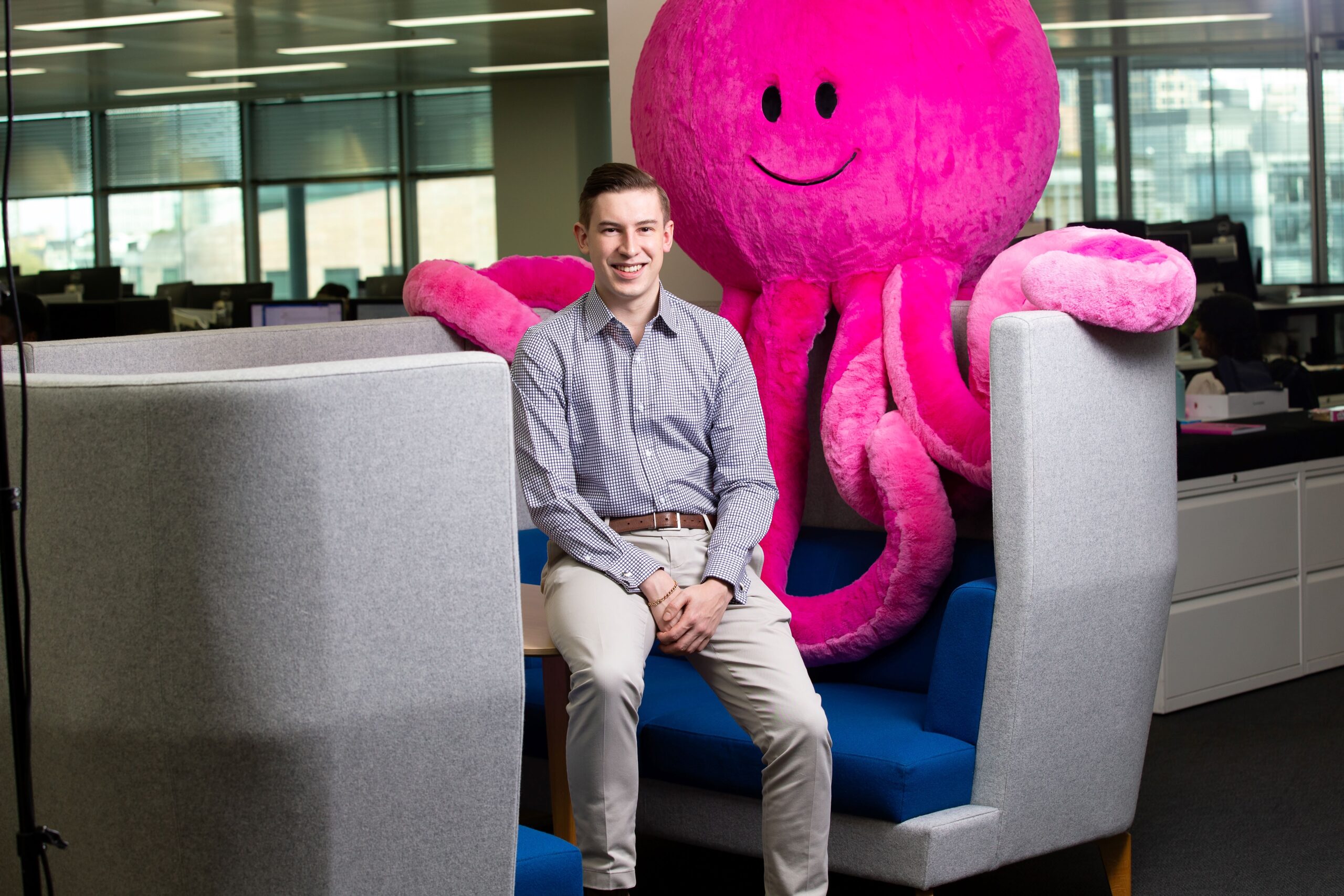- Kristian Manton, Chartered Financial Advisor at Octopus Money, is on a mission to get Gen Zs ‘Pensionmaxxing’, warning young people could be missing out on up to £90,000 (equivalent to 100 holidays abroad) by not making use of employer contribution matching.
- The average pension pot required to cover basic needs in retirement has surged by nearly 60% over the past few years, increasing from £68,300 in 2020-21 to almost £107,800 in 2023-24.¹
- More than 20% of private-sector workers aren’t saving into a workplace pension at all.²
This Talk Money week, Kristian Manton, the UK’s youngest-ever Fellow of the Personal Finance Society and a Chartered Financial Adviser at Octopus Money, is encouraging Gen Zs to improve their future financial resilience through a simple but valuable approach he calls ‘Pensionmaxxing’.
Gen Z and the rising cost of retirement
Recent data shows why it’s more important than ever for Gen Zs to act early on their pensions. The cost of a basic retirement has soared nearly 60% since 2020, with the average pot required to cover essential needs rising from around £68,300 in 2020-21, to almost £107,800 today ¹.
Yet, over 20% of private-sector workers aren’t saving into a workplace pension at all.² This lack of savings, combined with rising retirement costs, places younger generations at particular risk of financial instability later in life.
A quick conversation today, a larger pension pot tomorrow
Some employers will turbo-charge your pension by matching what you put in – essentially doubling your contributions up to a certain limit. ‘Pensionmaxxing’ is about taking control of your future finances with one simple action: find out if your employer will match your contributions, and then boost your own to maximise the value. It’s a golden opportunity that many people overlook, but it could potentially add tens of thousands to your retirement pot with just a small increase in what you’re already putting away.
Kristian Manton, Chartered Financial Advisor at Octopus Money said:
“Imagine a 22-year-old earning £25,000. If they’re automatically enrolled in their workplace pension, contributing 5% of their salary with their employer adding 3%, and if their investments grow at an average rate of 5% per year, their pension pot at age 65 could be approximately £120,000, after accounting for fees. This would be slightly above what’s projected to cover basic retirement needs.
The biggest boost comes when you choose to increase your contribution to get the most out of your employer’s match. By increasing their contributions to 7.5% and having their employer match it, the total contribution rises to 15%, which could grow their pot to around £210,000. This extra contribution of just £52 a month, or £1.70 a day, nearly doubles their retirement savings, adding an impressive £90,000 to their pot compared to sticking with automatic enrolment. That’s equivalent to spending money on 100 holidays abroad in retirement.”³
“Pensions remain one of the safest ways to save for your future, so if possible, it’s still worth maximising your contribution even if your employer doesn’t match beyond the standard contribution. For example, if a 22-year-old increased their contribution to 7.5% while their employer stayed at 3%, and assuming an average annual investment growth of 5%, their total pot would reach around £158,000 by retirement. That’s £38,000 more than if they’d only stuck with automatic enrolment, offering a substantial boost to their future financial security.”
“These are simplified examples that don’t factor in how your wages are likely to increase over the years, but they’re meant to show just how powerful pension contributions can be. With some employers offering matches up to 10%, not taking full advantage is like leaving free money towards your future income on the table. If you’re unsure what your options are, reach out to your HR team and find out exactly what you’re entitled to. A quick conversation today could mean a much larger pension pot tomorrow, and the peace of mind that comes with knowing you’re set up for the future.”
“Increasing your pension contributions can boost your future finances, but here are a few things to keep in mind: pension funds are generally tied up until you’re 57, contributions mean a smaller paycheck today – which could strain a tight budget – and, like all investments, pensions can fluctuate in value. Make sure you’re prepared for these factors before making any changes.”
Mariama Malang, 31, a Project Support Manager living in Cambridge, reflects on pausing her pension contributions in her twenties and why she’d caution the younger generation to keep saving:
“When I look back, I kick myself for not investing more in my pension when I had the chance. With the way retirement costs are going up, I probably should have just taken the hit each month – thinking of it like a tax I couldn’t skip rather than something I could easily cut. If I could give one piece of advice to younger people, it would be to start contributing to your pension and stick with it – for the peace of mind, if nothing else.”
Seb Leman, 27, an Account Manager living in London, on how the cost of living crisis impacted his pension contributions:
“When I started my first job, it seemed like common sense to take home more money at the end of each month and not put it into my pension. I couldn’t understand the use of locking the money away in the middle of a cost of living crisis. Now that I’m a few years in, I’m trying to figure out how to take back a bit of control of my finances by prioritising saving money, whether that’s each day – making my lunch vs buying it, each month – with travel cards, or each year – reflecting on how much I’ve managed to tuck away in my pension.”
ENDS
Notes to editor
References
¹ Living Wage Foundation, 2024
² The Institute for Fiscal Studies, 2024
³ Finder UK, 2024 – Average cost of a holiday abroad in 2023 (£894)
